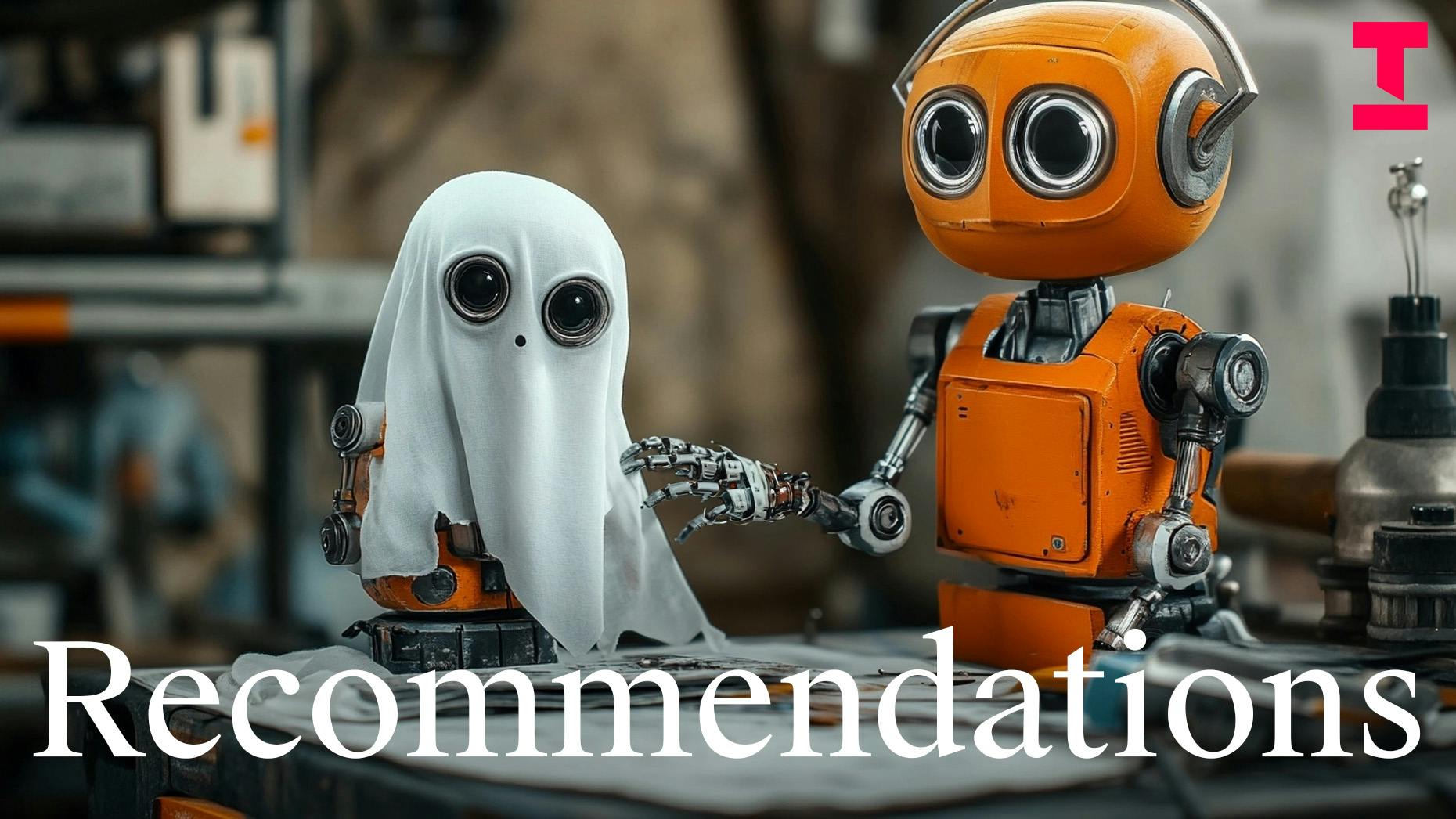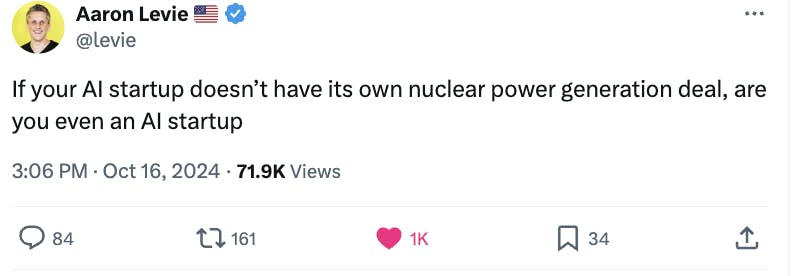| Welcome, Weekenders! In this newsletter: |
| • The Big Read: The Pro-Kamala tech lab hoping to outfox Elon Musk |
| • The Top 5: Our favorite new tech and business podcasts of 2024. Plus, the unshakeable Harry Stebbings, host of "20VC." |
| Plus: A spooky "Lost" that hasn't lost itself; globetrottin' teas; and what chocolate says about culture and capitalism. |
| |
| Quick, a test: How much does toothpaste cost? |
| Well, that's a bit of a trick question, actually, since it has multiple answers. The straightforward one: A tube of Crest Pro-Health costs $5.29 plus tax if you walk over to the Walgreens on Market Street. On Amazon, you can get a three-pack for $8.97. (What a bargain!) Either way, toothpaste is certainly cheap enough for Facebook employees to afford on a $400,000 salary. |
| Nevertheless, Meta Platforms recently discovered that roughly two dozen employees were misusing food allowances—$25 credits for the cost of meals—by using the money to buy such nonedible items as, yes, toothpaste, as well as laundry detergent, acne pads and tea bags, according to the Financial Times. Meta fired them, and afterward, one of the terminated Facebookers—who reported her former salary at roughly $400,000—whined about getting fired on Blind, the anonymous job reviews app: "On days where I would not be eating at the office, like if my husband was cooking or if I was grabbing dinner with friends, I figured I ought not to waste the dinner credit." |
| That's…the type of spectacularly dumb excuse best kept in your head, not shouted about publicly. My jaw nearly dropped onto my keyboard reading it. |
| After I regained my faculties, several realizations crossed my mind. Foremost, Meta shareholders should be aghast! I had thought the company was in a period of great efficiency and sober austerity. Somehow, though, Mark Zuckerberg is still handing out free food. Or, rather, free toothpaste, I should say. (I know the meal credits are meant to soften the hardships of long hours—oh, boo-hoo—but in a cost-cutting era, asking highly educated adults to feed themselves doesn't seem unreasonable.) |
| It next occurred to me that this sort of expense-account chicanery happens often enough on Wall Street. But surely, Silicon Valley would know better: I thought we'd all agreed not to do whatever the bankers tell us. |
| And I'll guess how this will end: lawsuits! One angry financier tried to find restitution in just such a manner recently. In 2023, a London-based Citibank analyst sued the bank for wrongful termination after it fired him for lying on his expenses about a meal involving two sandwiches, two pasta dishes and two cups of coffee. |
| In Britain, a judge eventually tossed out the case. Still, I'd wager a roll or two of Crest that a couple people might want to see if they have better luck here in America.—Abram Brown |
| |
|
 |
|
| The outcome of next month's presidential election seems likely to come down to the thinnest of margins: thousands of votes in a few swing states, such as Pennsylvania and Arizona. Both sides are actively engaged in a high-stakes mobilization effort to get voters registered—and, yes, casting mail-in ballots. |
| Elon Musk's well-funded America PAC is doing that work for Donald Trump. And our Josh Koehn has an exclusive look at the San Francisco–based Democratic outfit doing it for Kamala Harris, the simply named Tech for Campaigns. The Democratic PAC has raised money from a slew of wealthy techies—Ron Conway, Sam Altman, Y Combinator's Jessica Livingston—and has spent the past four years honing its digital strategies for cajoling low-propensity voters into registering and casting their decision in mail-in ballots. (The PAC is focusing on mail-in ballots because they, theoretically, require these apathetic voters to do less work than actually going to stand in line and vote on Election Day.) |
| Unquestionably, Musk's PAC has more money. Tech for Campaigns hopes its years of experience give it a leg up. "I know that we have three and a half years' extra experience on him," said Jessica Alter, the former tech executive who is the PAC's board chair. "It's not just about money—it's about all the learning and the testing that we do." |
|
 |
|
| There's a standing joke in Silicon Valley these days: Are you really a successful venture capitalist if you don't have a hit podcast? |
| By such thinking, Harry Stebbings certainly qualifies: His "20VC" has become a new Silicon Valley must-listen, with guests like Altman and Reid Hoffman. Stebbings took a somewhat different path from other venture capitalists with podcasts: He achieved podcast stardom before raising serious money, rather than the reverse. Stebbings, who is based in Britain, has a new $400 million fund, a rarity in a moment when venture funding is still pretty dead and European tech hasn't shown much of a pulse lately. He ascribes his success not to any innate talent or high degree of intelligence but to his willingness to work obsessively. |
| "The question that no one ever asks me that they should ask me is, 'Respectfully, you've got to a place where you probably shouldn't have got to. How did you do that?' And my answer is, 'My ability to become addicted to things and really lock in,'" Stebbings told me. |
| Plus, my piece includes our list of the best new tech and business podcasts of 2024, which includes a tale of digital doppelgängers run amok, an examination of the media industry and, perhaps unsurprisingly, another hit show with a pair of VC hosts (that would be Bill Gurley and Brad Gerstner). |
| Abram Brown, editor of The Information's Weekend section, is wondering how to do a Paul Mescal–shaped jack-o'-lantern. You can reach him at abe@theinformation.com or find him on X. |
| |
 |
| Buying: Globetrottin' Tea |
| I've recently grown fond of unwinding after work with a glass of the latest concoction from Brooklyn-based Unified Ferments. The relatively small company, which was founded in 2020, produces batches of nonalcoholic, fermented teas that taste more like a fine bottle of natural wine than like an average kombucha. |
| Each 750-milliliter bottle is brewed using single-origin teas from far-flung locales, producing a medley of complex flavors. The Snow Chrysanthemum, for instance, is made with tea leaves sourced from beneath the snow of China's Kunlun Mountains, while another tea is "wild harvested" in Quebec's northern forests. |
| I especially like the Jasmine Green served chilled. Unified Ferments suggests paring it with "saltwater fish, pho, herby salads or anything which could benefit from a highly aromatic pairing."—Paris Martineau |
| Reading: Candied Conquest |
| Chocolate is a delight. It is also a commodity, one driven by prices "rising and falling at the merciless logic of supply and demand," as author Rowan Jacobsen puts it in "Wild Chocolate." Jacobsen's book belongs on the same shelf as Mark Kurlansky's "Salt" from 2003, which spawned an entire subgenre where the authors trace the outlines of culture and capitalism by focusing on a single food item. Generally, the durability of this conceit depends not only on the author's skill but also on the food's prominence in our lives. (Kurlansky himself had much less success writing about cod and oysters.) Jacobsen was smart enough to pick something nearly everyone loves. |
| Indeed, chocolate has mattered a great deal for centuries, and Jacobsen's history hopscotches the globe across the Amazon, Africa, Europe and America. The wildest bits in "Wild Chocolate" tend to be in the distant past—when chocolate was valuable enough to kill for. When the conquistadors reached Tenochtitlán in 1519, for instance, their rapacious pursuit of treasure had them on the hunt for gold. They found some of that in Montezuma's vaults—along with a large stockpile of cacao beans. (His empire used the beans as currency.) The Spanish spread the cultivation of chocolate around the world as demand grew, and the European elites "noted what the Mayans had known for centuries: a shot of chocolate delivered a nice little flush of euphoria."—A.B. |
| Watching: A Scary, Sturdier Version of "Lost" |
| Ever since "Lost" premiered in 2004, I've been chasing the weekly TV high of that addictive, mysterious first season—and a reparative experience to help me forget the show's terrible finale. Every few years, a promising new candidate comes along, but it almost always runs into the same problem—most recently demonstrated by "Dark" on Netflix—of starting off full of intrigue but falling apart in the second and third seasons amid a tangle of time loops. |
| "From" on MGM+, by contrast, seems to be on very solid footing as it progresses through its third season. The horror series, which is produced by some of the creative team from "Lost," follows a group of strangers trapped in a town that no one can ever leave. Meanwhile, the monsters that come out after dark are only the start of the nightmares that await them. It's incredibly gory, the plot twists are a little bit out there and the acting is a mixed bag. But I cannot stop watching. |
| Most importantly, there's a critical difference between "Lost" and "From": "From" has an ending in mind. In fact, the lead actor on "From," Harold Perrineau, who appeared in two seasons of "Lost" before getting haphazardly written off the show, |
| refused to sign onto "From" until he had a guarantee from the writers that they would have a satisfying ending. That's a good enough promise to keep me around for a few more seasons.—Julia Black |
| |
|
 |
| We're all gonna end up like the three-eyed Simpsons fish, aren't we? |

0 comentários:
Postar um comentário